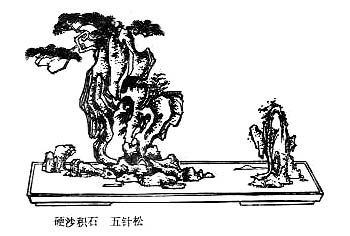論
語
Lun Yu 
 – The Analects of Confucius
– The Analects of Confucius
The Master discusses with his disciples and unveil his preoccupations with society. Tr. Legge (en), Lau (en) and Couvreur (fr).
Lunyu XII. 22. (315)
About benevolence and wisdom;– how knowledge subserves benevolence.
1. Fan Ch'ih asked about benevolence. The Master said, "It is to love all men." He asked about knowledge. The Master said, "It is to know all men."
2. Fan Ch'ih did not immediately understand these answers.
3. The Master said, "Employ the upright and put aside all the crooked; in this way the crooked can be made to be upright."
4. Fan Ch'ih retired, and, seeing Tsze-hsiâ, he said to him, "A Little while ago, I had an interview with our Master, and asked him about knowledge. He said, 'Employ the upright, and put aside all the crooked;– in this way, the crooked will be made to be upright.' What did he mean?"
5. Tsze-hsiâ said, "Truly rich is his saying!
6. "Shun, being in possession of the kingdom, selected from among all the people, and employed Kâo-yâo, on which all who were devoid of virtue disappeared. T'ang, being in possession of the kingdom, selected from among all the people, and employed Î Yin, and an who were devoid of virtue disappeared."
Legge XII.22.
Fan Ch'ih asked about benevolence. The Master said, 'Love your fellow men.'
He asked about wisdom. The Master said, 'Know your fellow men.' Fan Ch'ih failed to grasp his meaning. The Master said, 'Raise the straight and set them over the crooked.9 This can make the crooked straight.'
Fan Ch'ih withdrew and went to see Tzu-hsia, saying, 'Just now, I went to see the Master and asked about wisdom. The Master said, "Raise the straight and set them over the crooked. This can make the crooked straight." What did he mean?'
Tzu-hsia said, 'Rich, indeed, is the meaning of these words. When Shun possessed the Empire, he raised Kao Yao from the multitude and by so doing put those who were not benevolent at a great distance. When T'ang possessed the Empire, he raised Yi Yin from the multitude and by so doing put those who were not benevolent at a great distance.'
Lau [12:22]
Fan Tch'eu demanda en quoi consiste la vertu d'humanité. « Elle consiste à aimer les hommes », répondit le Maître. Fan Tch'eu demanda en quoi consiste la connaissance. « Elle consiste à connaître les hommes », répondit Confucius. Fan Tch'eu ne comprenant pas, le Maître dit : « En élevant aux charges les hommes droits, et en écartant les méchants, on peut déterminer les méchants à se corriger. » Fan Tch'eu, s'étant retiré, alla trouver Tzeu hia, et lui dit : « Tout à l'heure, j'ai été voir le Maître, et lui ai demandé en quoi consiste la connaissance. Il m'a répondu : “En élevant aux charges les hommes droits et en écartant les méchants, on peut déterminer les méchants à se corriger.” Que signifient ces paroles ? » Tzeu hia dit : « Ces paroles sont pleines de sens : Quand Chouenn régnait sur le monde, il choisit Kao iao d'entre la multitude et le promut au rang de ministre ; les méchants s'en allèrent bien loin. Quand Tang régnait sur le monde, Il choisit I in d'entre la multitude et le promut au rang de ministre, tous les méchants disparurent. »
Couvreur XII.21.

The Analects of Confucius – Lun Yu XII. 22. (315) – Chinese on/off – Français/English
Alias the Lunyu, the Lun Yü, the Analects, les Entretiens du maître avec ses disciples.
The Book of Odes, The Analects, Great Learning, Doctrine of the Mean, Three-characters book, The Book of Changes, The Way and its Power, 300 Tang Poems, The Art of War, Thirty-Six Strategies
Welcome, help, notes, introduction, table.
Index – Contact – Top























